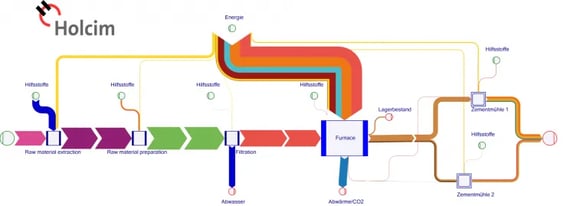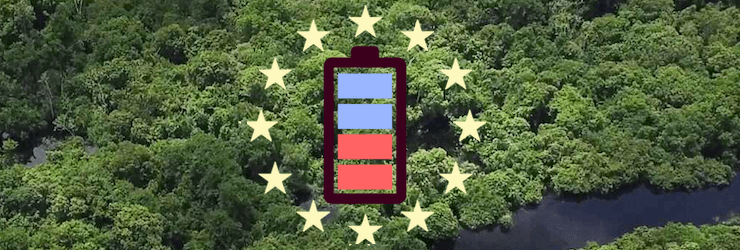Welches Produkt wird weltweit am meisten produziert – Stahl, Zement, Kunststoff oder Papier? Hätten Sie die Antwort auf diese 1-Millionen-Euro-Frage bei „Wer wird Millionär“ gewusst? Der Kandidat war sich nicht sicher und verließ die Show mit „nur“ einer halben Million, aber wir können Ihnen nun sagen: Es ist Zement!

Zusammen mit LafargeHolcim, dem weltweit größten Zementhersteller, visualisierten wir die Energieflüsse für die Zementproduktion im norddeutschen Lägerdorf.
Die Ergebnisse stellte Werner Carstensen, Prokurist und Category Manager bei der Holcim Deutschland GmbH, auf dem Ressourceneffizienz-Treff 2018 in Hamburg vor. Auf dieser von ifu Hamburg organisierten Veranstaltung tauschten sich mehr als 80 Teilnehmer aus Industrie, Beratung und Forschung über Energie- und Ressourceneffizienz aus.
Zementherstellung
Zement prägt maßgeblich die Welt, in der wir leben, verbindet uns über Brücken, Autobahnen und Häfen und bietet Raum zum Leben und Arbeiten, von kleinen Einfamilienhäusern bis hin zu riesigen Wolkenkratzern. Es wirkt als Bindemittel, das zusammen mit Wasser und anderen Komponenten zu Mörtel oder Beton verarbeitet werden kann.
Zement basiert auf Kalkstein, Ton und Sand sowie Sekundärrohstoffen wie zum Beispiel Flugasche. Seine Produktionskette beginnt mit dem Kalksteinabbau und führt in einen Ofen, in dem die Komponenten bei hohen Temperaturen über 1000°C zu Zementklinker gebrannt werden. Um diese hohen Temperaturen im Ofen zu erzeugen, werden große Mengen an Brennstoffen benötigt, was zu hohen CO2-Emissionen führt.
LafargeHolcim – der weltweit größte Zementhersteller
LafargeHolcim ist der weltweit führende Zementhersteller mit einem Fokus auf Nachhaltigkeit. Einer der Produktionsstandorte liegt im norddeutschen Lägerdorf und liefert jährlich 1,3 Millionen Tonnen Zementklinker. In diesem Zusammenhang emittiert die Fabrik pro Jahr mehr als 1 Million Tonnen CO2, von denen 2/3 prozessbedingt und nur 1/3 energiebasiert und somit beeinflussbar sind.
Sankey-Diagramme – Energieflüsse visualisieren

Das ifuHamburg-Team unterstützte LafargeHolcim bei der Erstellung von Material- und Energieflussmodellen visualisiert als Sankey-Diagramme für den Produktionsstandort Lägerdorf. Mit ihrer LCA Software Umberto können Mengenströme innerhalb einer Produktionskette analysiert und dargestellt werden, wobei die wichtigsten Ströme sofort durch die Größe ihrer Pfeile ersichtlich sind. Werner Carstensen, Prokurist und Category-Manager der Holcim Germany GmbH sagt dazu: „Wir haben gesehen, dass der Ofen bei den Energieströmen alles bei weitem überlagert und somit das größte Optimierungspotenzial darstellt.“
Maßnahmen zur Verringerung der Emissionen
Um den CO2-Ausstoß zu reduzieren, ist es daher notwendig, den Anteil von Ersatzbrennstoffen aus biogenen Quellen zu erhöhen und die Brennstoffmenge aus fossilen Ressourcen zu verringern. Diese Ersatzbrennstoffe aus regenerativen Quellen oder aus Recyclingmaterial können variieren und gehen mit geringeren CO2-Emissionen einher. Je nach lokaler und zeitlicher Verfügbarkeit verwendet LafargeHolcim beispielsweise Recyclingmaterial aus Windkraftanlagen, Dachpappe oder Tiermehl.
Um die CO2-Emissionen weiter zu reduzieren, hat LafargeHolcim neue Zementklinker entwickelt, die z. B. höhere Mengen an Hüttensand enthalten, einem Nebenprodukt der Roheisenproduktion. Diese neu entwickelten Zementklinker bieten ähnliche Eigenschaften wie herkömmliche Zementklinker, können jedoch die CO2-Emissionen im Rahmen der Produktion um bis zu 70% senken!
Ein bisher ungelöstes Problem bleibt der prozessbedingte CO2-Ausstoß, der nicht vollständig reduziert werden kann. Zementproduktions-Standorte bieten ideale Voraussetzungen für die Anwendung zukünftiger Technologien zur Abscheidung und Speicherung von Kohlendioxid. Diese Technologien sind jedoch derzeit noch Zukunftsmusik.
Über die Autoren: Jana Hinners und Martina Prox
Jana Hinners hat gerade ihre Promotion in Biologie an der Universität Hamburg abgeschlossen und beginnt bald als Postdoctoral Researcher an der University of Edinburgh.
Martina Prox ist Expertin für Nachhaltigkeitsstrategie bei ifu Hamburg, Mitglied der iPoint Group. Seit mehr als 20 Jahren beschäftigt sie sich mit den Themen Nachhaltigkeit und Ressourceneffizienz.




.png)

